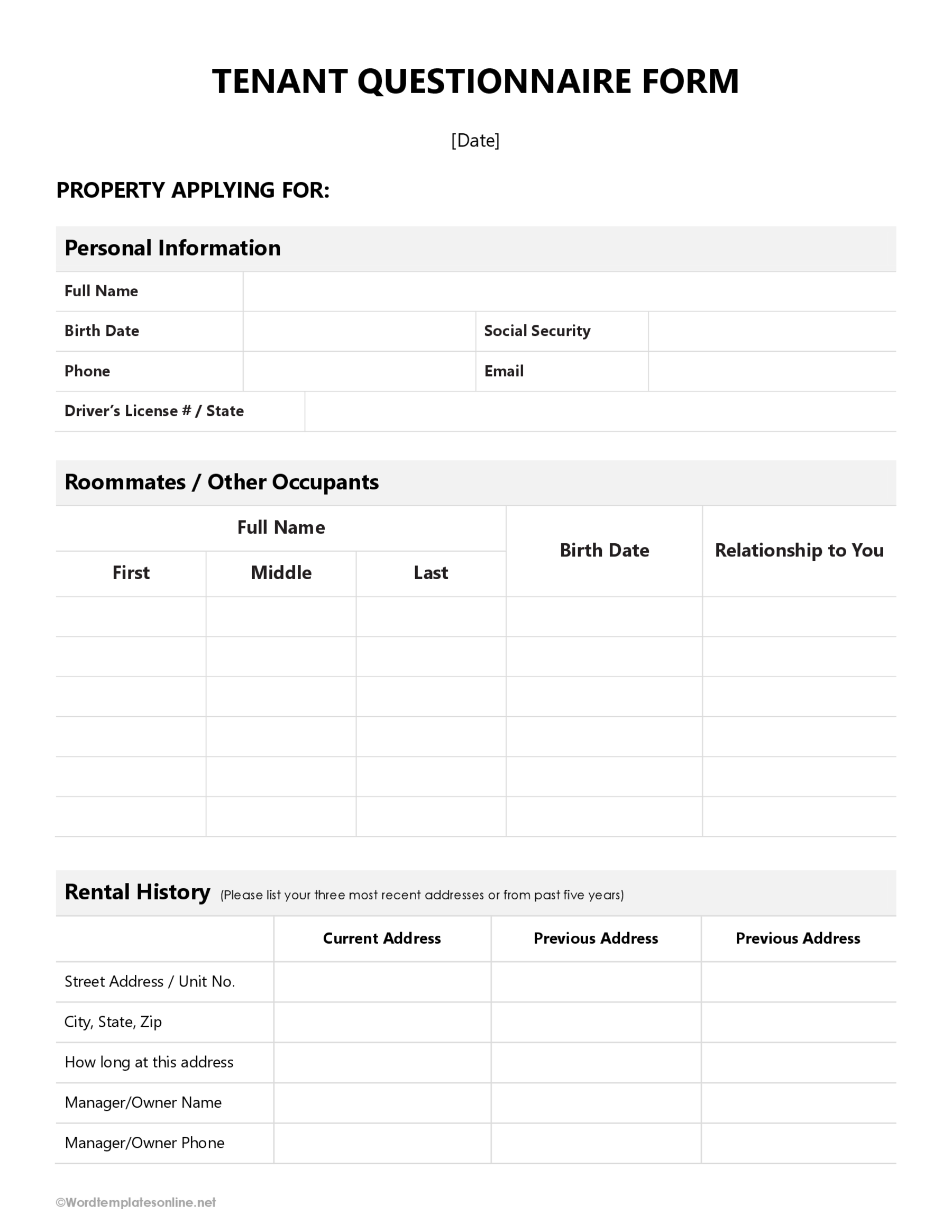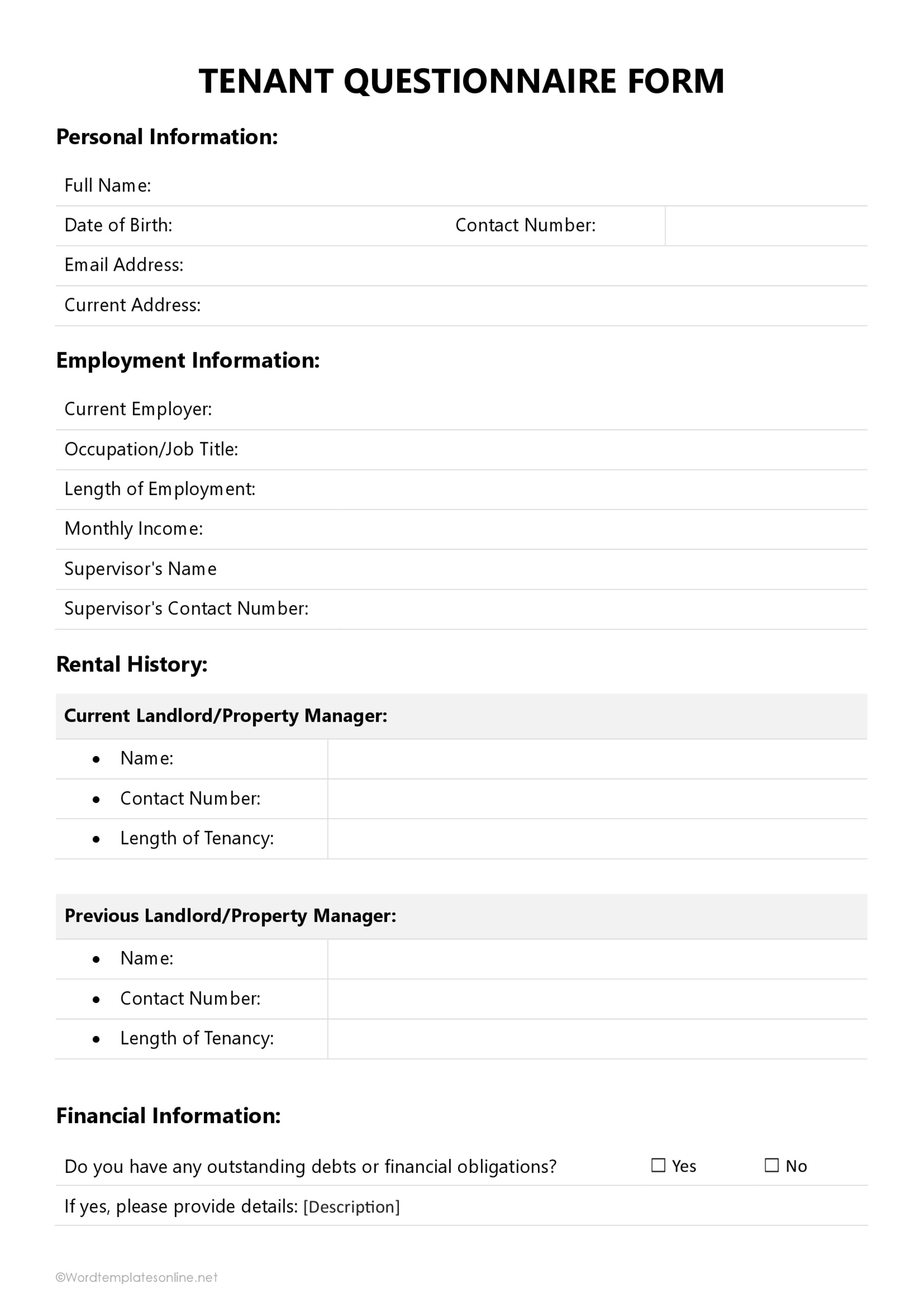Landlords and property managers have to screen prospects before approving them for tenancy. This is because good tenants reduce the occurrence of disputes and cases of default. A questionnaire form is a document used to collect a prospective tenant’s information to determine if they fulfill the required criteria for approval during the tenancy application stage. It has questions for the prospects to provide details regarding their personal information, rental background, employment history, income verification, rental references, and other facts relevant to the tenancy.
Once the questionnaire form is completed, landlords and property managers can review it, verify the tenant’s credentials, and decide whether to approve the application or not. Using the form ensures that unsuitable prospects are eliminated during the screening stage. It is also a standardized approach for gathering information needed to evaluate potential tenants and make informed decisions during selection.
This article discusses the key components of a questionnaire form for screening prospective tenants and how you can create one as a landlord or property manager. It also mentions the legal considerations when using such a form to collect potential tenants’ information.
Free Forms


Key Components
The form is meant to collect key information needed to make an informed decision on who to select from the prospects. So, while the questions may vary from case to case, some will be common in most questionnaire forms.
Most forms will have questions regarding the following aspects:
Personal information
The form collects a prospect’s identification and contact information to help determine the identity of the person applying for a tenancy and provide a way to contact them. This section of the form prompts the tenant to input their name, phone number, email, and mailing address. Emergency contact can also be requested to ensure you can reach the prospect in case of emergencies should they get selected.
Employment and income verification
Employment status and income are significant considerations when assessing the suitability of a potential tenant. This is because the employment status indicates the prospect’s earning stability and their income indicates their capability to meet rental financial obligations. This section should thus have questions regarding the applicant’s current job title, employer, duration of employment, and contact details. Also, use this section to request pay stubs, bank statements, or tax return files in order to determine their income.
Rental history
You should include questions to collect information regarding the applicant’s rental history in order to determine how they behaved in their previous tenancies. Ensure to ask for the property’s address, name of the landlord or property manager, and contact information. You can then contact the previous landlords and enquire about the prospect’s conduct within the premises, observance of contractual obligations such as payment of rent on time, and personal qualities that would make them a suitable tenant or not.
Background information
It is important to request the applicant’s consent for a criminal background in order to determine information such as criminal history. You can also use this section to ask about their pet ownership status and smoking preferences. This information will help determine if the tenant’s suitability aligns with your rental policies and property rules.
Additional questions or requirements
You can also use the form to gather any other information you may need to make a conclusive decision. You can tailor these questions to your specific criteria as they are not limited to specific topics. For example, you can ask tenants to state their preferred lease terms, number of occupants, type of house they need, amenities they require, special requests, etc. Additionally, you can use this section to mention any specific requirements you want your tenants to fulfill, such as credit score and income limit.
note
You can reference the following infographic to determine the primary questions you should include in a questionnaire form for rental applicants.
How to Create a Tenant Questionnaire?
Our printable templates, available online, can be used to guide you on how to create a questionnaire form for your rental applicants. A template outlines the general structure of the form and the type of questions you should include to ensure you do not forget to ask for key information. However, you can customize the questions to fulfill your specific screening needs. The template is thus an excellent starting point and can save you the time and effort needed to create the form from scratch.
Below is a complete guide on how to create a questionnaire form for collecting information using a template:
Step 1: Find a reliable template
Firstly, search for a suitable template online. Variations of templates are available to provide you with options for creating the questionnaire form. Review several templates and select a printable and user-friendly option that complies with applicable laws and regulations.
Step 2: Review and customize
Secondly, modify the content and structure of the form. You can do so by starting with high-priority questions and adding or removing sections you may or may not need. The key sections you should include were mentioned earlier in this article. However, the sections can vary depending on your screening criteria, property rules, and local laws.
Step 3: Personalize the layout
Next, tailor the design of the questionnaire form to align with your brand or property. You can add the property name and logo and modify the color and font. This makes the form look more professional. Also, ensure that each section is clearly labeled.
Step 4: Tailor the questions
Then, add, remove, or modify the questions enlisted under each section based on your selection criteria. The template is meant to serve as a guide, not a conclusive draft of the information you should collect.
Step 5: Legal compliance
Afterward, review the applicable local laws governing tenancy screening, such as fair housing, data protection, special groups protection laws, etc. Adjust the template to comply with these laws and regulations. You can do so by modifying the wording or adding a disclaimer that addresses the legal requirements of the associated law.
Step 6: Test and refine
Next, fill out the printable template and ask someone else to do so to test how effective it is in collecting the required information. Then, identify areas that need improvement and revise the template to make it more effective and user-friendly.
Step 7: Provide instructions
Lastly, add a statement defining the document’s purpose and instructions on how prospects can complete it appropriately. Start by adding a statement at the beginning of the template that clarifies the use of the questionnaire. These instructions should inform users about attachments they should include, such as pay stubs, written consents, or copies of their identification documents.
Note
A well-crafted questionnaire form can be incredibly helpful when screening tenants. Here is an infographic illustrating the dos and don’ts of creating such a form.
Legal Considerations and Data Protection Practices
A tenant screening process should be compliant with any applicable laws and regulations. So, it is mandatory to consider these regulations when collecting people’s information through a questionnaire form for screening purposes.
The legalities you should ideally comply with are discussed below:
Adhering to local laws and regulations
The jurisdiction where your property is located will have laws and regulations regarding different aspects of tenancy, such as fair and transparent screening. Review these laws and regulations and ensure your questionnaire is compliant to avoid future legal disputes.
Ensuring data privacy and security of tenant information
Tenants have the right to data privacy and security. Additionally, it is your responsibility as a landlord or property manager to ensure this right is protected during the screening process. Therefore, have secure storage systems and access restriction protocols such as encryptions to protect both physical and digital data. Also, inform the prospects of your data protection practices to reassure them that data confidentiality will be maintained.
Obtaining consent for background checks, if applicable
Always obtain written and explicit consent from applicants before conducting background checks. In the request, clarify to the prospects the purpose and scope of the background checks. Make sure they understand their rights and how the collected information will be utilized. Also, retain the consent documentation as it may be required later.
Final Words
You should consider using forms to collect information from potential tenants in order to evaluate their suitability. The form provides standardized questions that help you consistently collect similar information. This simplifies the tenant screening process as the criteria can be applied uniformly to all prospects.
A template helps you make a comprehensive questionnaire that collects all the key information needed to make the best selections. You can download such printable templates, customize them, and issue them to any prospect interested in renting your property. However, always ensure the template complies with any fair housing and data protection or any other laws applicable in your jurisdiction.




